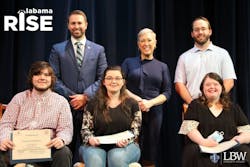Virtual Reality Can Train Workers with Disabilities for Supply Chain Jobs
Everyone needs a purpose and a job.
This is the mission of the Alabama RISE (reemerging ideas for successful employment) program. Created by Brock Kelley, President of Lurleen B. Wallace Community College, the program helps people with intellectual disabilities find jobs.
“I felt there was a way to match these students, 70% of which are not in the workforce, with companies that needed employees,” said Kelley. And he is the right person to drive this program. He began his career as a special education teacher and before his current position, he served as a Regional Director of Workforce Development for The Alabama Community College System.
Economics of Hiring People with Disabilities
“Employers are in need of more employees, and research has shown that this population takes fewer sick days and has a higher retention rate as compared to other populations," says Kelley. “This is an excellent solution for both employers and this particular talent pool.”
In a paper, “The Economic argument for hiring people with disabilities, published in the Humanities & Social Sciences Communication (Jan. 22, 2021), author Thomas Aichner used a wide variety of sources to conclude that there were a number of advantages to hiring this group including:
- Lower absenteeism rates
- Lower employment turnover
- Higher ROI in training and development
- Overall more positive work environment
- Increased productivity
- Higher levels of motivation
- Increased business performance, market share, and shareholder value
Technology Aids Training
The RISE program collaborates with tech company TRANSFR. Using virtual reality (VR) students are able to engage in simulations that help them gain a type of on-the-job experience that prepares them for in-demand roles—including those with logistics companies. “Immersive learning can create experiences for both learning and exploring that would otherwise be difficult or impossible to replicate in the classroom,” said Bharani Rajakumar, founder and CEO of TRANSFR.
TRANSFR, based in New York City, says its mission is to build a “classroom to career pipeline” through the use of technology.
Creating a Career Path
Building a career is the end goal of this program. “Beginning in 2020, our goal was to look at some of the senior high school students with these disabilities and see if they had career paths,” explains Kelley. “Once they put the goggles on, we can actively put them in a situation where they are using their hands and learning and exploring different career options. Then based on their interests and aptitude we can match them up with available jobs.”
Determining the aptitude and interests of these students is key and often a reason that many companies are uncertain about using this talent. Kelley points out that by using this type of technology a company can understand how a candidate will be able to complete job tasks. And having an education system, such as Alabama’s Community College System, being a liaison between the students and companies, it's a much easier process for employers to tap into that talent.
As far funding for the program, the salary for the RISE program coordinator is paid by Lurleen B. Wallace Community College. The funds for the students for the first cohort were paid by a combination of State and Federal Adult Education Grant dispersed by the Alabama Community College System. However, depending on the pathway the student is on, that will determine what funds are available. For instance, if the student is taking credit-bearing courses, Federal Pell grant, WIOA Funds, and Non-Traditional Scholarships are available.
Future Workforce
For the initial class, two of the students went to work for Andalusia Distributing Company and they have several other local businesses on board for the next cohort. Kelley sees this program growing as more students are brought into the program and more businesses express interest.
“As businesses grapple with widespread supply chain worker shortages, it is imperative that we open these jobs to everyone– including those with disabilities, a population that has historically been overlooked. And we hope more institutions of higher education and businesses across the country will replicate this model,” says Rajakumar.
Andalusia Distributing company agrees. “We are very excited to be part of the pilot program and hope it becomes a playbook for programs not just in our area but across the state.”
